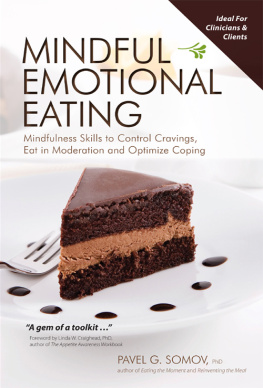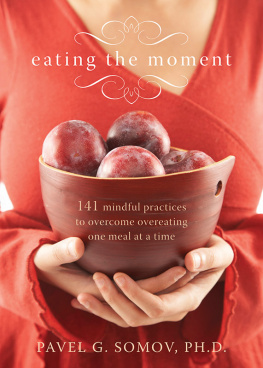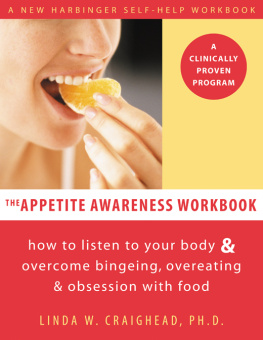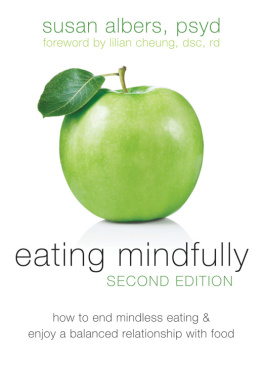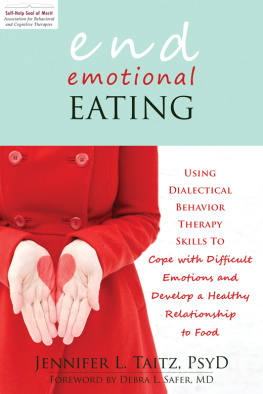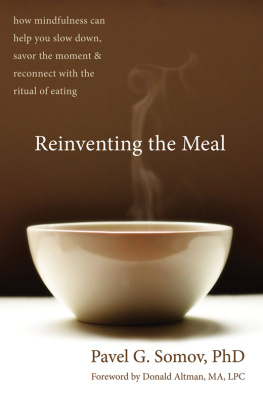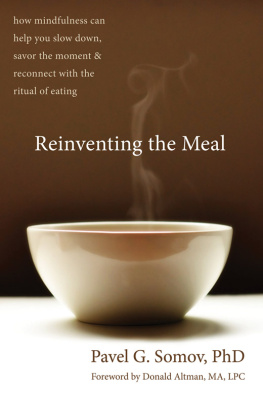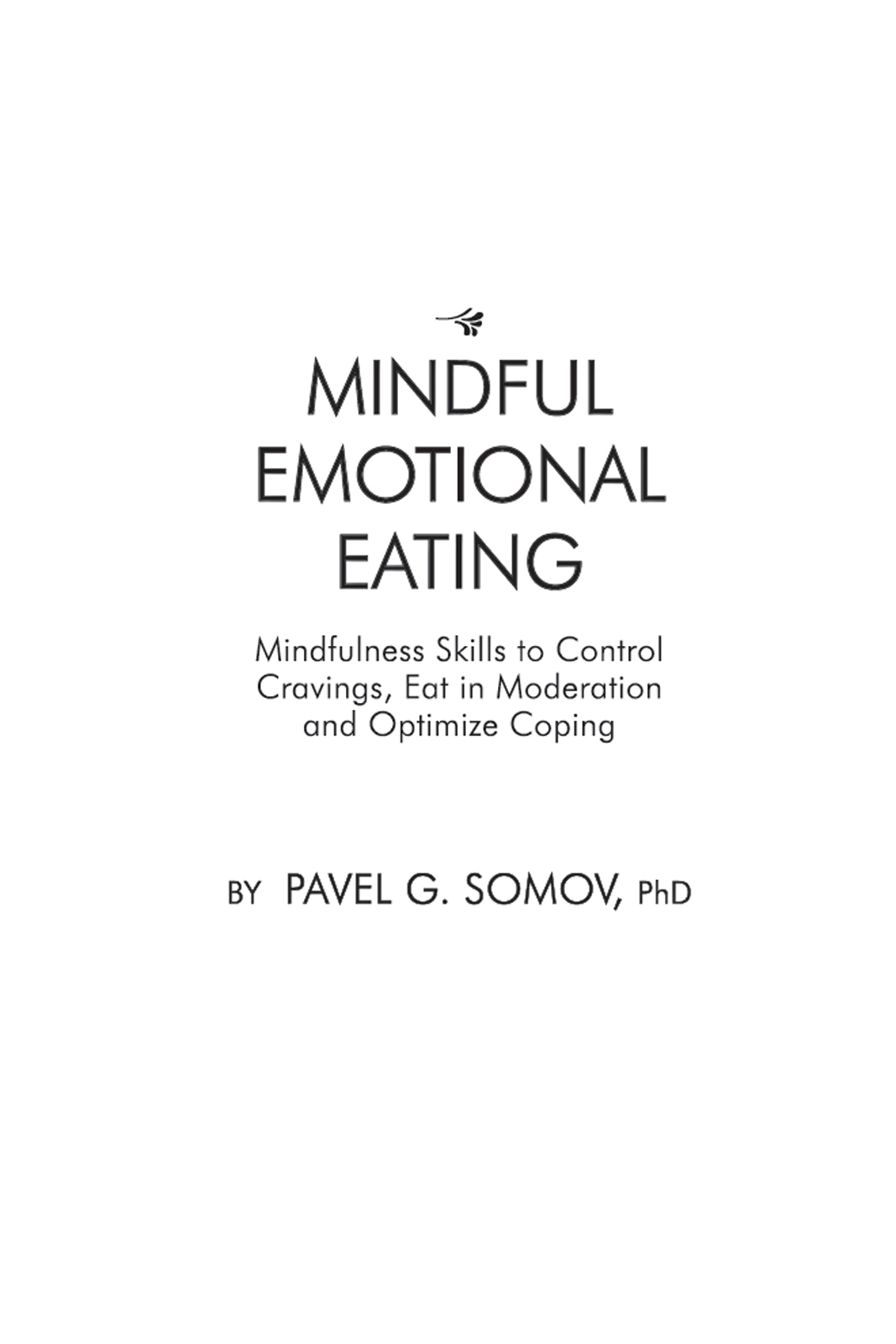
Copyright 2015 by Pavel G. Somov
Published by
PESI Publishing and Media
PESI, Inc
3839 White Ave
Eau Claire, WI 54703
Cover Design: Amy Rubenzer
Layout Design: Amy Rubenzer
Edited By: Kayla Omtvedt
Printed in the United States of America
ISBN: 9781559570039
All rights reserved.

Dont be fooled by the seeming contradiction in the title of Mindful Emotional Eating. The book makes the case to troubled eaters and their treaters that if were going to turn to food when were stressed or distressed, we best do it not with guilt, shame, self-hatred, or detachment from our bodies and their cravings, but with a keen mindfulness that will satisfy our appetites and foster emotional well-being.
Karen R. Koenig, LCSW, M.Ed., psychotherapist, eating coach, and and author of Outsmarting Overeating
This wonderfully creative book teaches us that we dont need willpower to overcome our unruly eating habits, but mindfulness skill power. It shows that freedom doesnt come from stopping emotional eating, but when we learn how to eat emotionally in moderation, more effectively and without self-judgement or self-loafing. Pavel Somov has put together a fun mindfulness toolbox for not only healthcare professionals, but anyone who struggles with emotional eating.
Alexa Frey, Co-Founder, The Mindfulness Project, (London, UK)
Dr. Pavel Somovs newest book, Mindful Emotional Eating, offers individuals struggling with eating concerns a revolutionary guidebook for developing a satisfying, enjoyable relationship to food. The book challenges prevailing notions by de-pathologizing emotional eating and affirms that emotional eating is one among many ways that we can care for ourselves. His humanistic harm reduction approach helps people shift from demonizing emotional eating to affirming that we all eat for emotional reasons. The positive change we seek is from mindless to mindful moderate emotional eating. His mindful emotional eating (MEE) process is the antidote to the shame, blame, self-attacks and rebellious over-eating that characterize mindless emotional eating. MEE empathizes with peoples need to self-soothe and empowers people to choose how they want to do it. His Jumpstart is filled with inspiring ideas and practical strategies for developing moderate emotional eating. Ultimately this book helps us become aware, self-compassionate and empowered with the confidence and skills to choose how to best care for ourselves in each moment. Quite a lot to get from one small book! I highly recommend it to practitioners and people with eating concerns.
Andrew Tatarsky, PhD, leading expert in Integrative Harm Reduction Psychotherapy
In his usual straight-shooting, paradigm shifting, make a change oriented style, Pavel Somovs Mindful Emotional Eating gives anyone struggling with emotional eating, a handy and concise how-to roadmap to change.
Donald Altman, M.A., LPC, author The Mindfulness Toolbox, One-Minute Mindfulness, and Art of the Inner Meal
Pavel G. Somov provides an ingenious, non-judgmental, mindful approach to emotional eating (this includes ALL eating) that is based on skillpower, not willpower. In this guide for clinicians, he gives specific step-by-step instructions for how to eat mindfully that fully empowers clients to feel good about eating and changes the paradigm from deprivation and guilt to self-acceptance and self-control. He breaks down this process into tasks, language, narratives and homework to use in each clinical session with clients. This book gives you everything you need to help clients change their mindset about eating and to apply effective mindfulness skills to the realm of cravings, over eating, binge eating, nighttime eating, weight management and eating driven by specific emotions. This might be the last book on helping with emotional eating that you need to buy.
Debra Burdick, LCSWR, BCN, author of Mindfulness Skills Workbook for Clinicians and Clients and Mindfulness Skills for Kids & Teens
Lets be honest. We all eat with emotions involved in the process. We eat for survival, for comfort, for energy, for relief and for pleasure and all those motivations include an emotional component. The path to health is not to deny the role of emotion in eating. Rather, the task is to make intentional decisions about our eating patterns. In this accessible and compassionate book, Pavel Somov shows you path to breaking unhealthy eating patterns. He offers clear insights, skills and practices you need to be a more mindful eater. By following his guidance, you will not only make eating decisions that better support your health; you will also feel better about yourself and your relationship to food. As an added bonus, you will develop mindfulness skills that will be so helpful in many other areas of your life.
Terry Fralich, LCPC, JD, author of Cultivating Lasting Happiness & The Five Core Skills of Mindfulness

About the Author
Pavel G. Somov, Ph.D., is author of 7 mindfulness-based books, including Reinventing the Meal, Eating the Moment, Present Perfect, The Lotus Effect and Anger Management Jumpstart. He is on the Advisory Board of the Mindfulness Project, (London, UK) and he regularly blogs and writes for PsychCentral. Dr. Somov lives, works, and meditates in Pittsburgh, PA.

Contents

Foreword
Pavels Mindful Emotional Eating is a gem of a toolkit that will be invaluable both to individuals seeking a mindful eating self-help option and to practitioners looking to infuse more mindfulness into their work with clients distressed by emotional eating. The humanistic harm reduction approach is a breath of fresh air on a topic that is particularly difficult to address sanely in the current culture. Obesity has become a hot topic; it threatens the health of the next generation and will bankrupt our health care system if we cannot find a better way to come to terms with the inherent double bind society has created. Food is engineered to appeal directly to our biologically-based preferences for sugar and fat and food is more accessible than ever before. We are subjected to an overload of advertising with the messages: Indulge yourselfyou deserve it and More is better. A tall is the smallest option even available at Starbucks. Marketers appear to believe that small or medium sounds so negative that only a fool would want such an option. If food portions are all above average, our weight will also be above average.
Under the current circumstances, no knowledgeable person is surprised by the increase in obesity, but short of invoking a food police state, a viable solution remains elusive. Substantial long-term weight loss for those who are already obese requires nothing less than a lifestyle makeover that must be maintained forever, and only the most motivated individuals have been able to do this successfully. Many experts in the field have essentially given up on treating morbid obesity except for bariatric surgery that puts up physical roadblocks that slow down overeating. Hope for the future is pretty much invested in prevention and early intervention, especially in children where we may be able to moderate eating behaviors before our bodies are already compromised. This is where the current push for mindful eating comes into play and where Pavels work has such an important role. Mindful eating can in fact take a person who is overeating and restore a more natural eating pattern that is less likely to contribute to weight gain even in our food-rich culture. However, I caution that expectations (of oneself or ones clients) must be realistic about weight loss. Mindful eating is a great tool but substantial weight loss requires a bit more. To get rid of the accumulated effects of overeating, some period of subnormal eating and/or high intensity exercise will be needed. Thus, obese individuals must understand that while mindful eating is great (and the best option available to avoid aversive deprivation states), it is not a magic bullet that will solve all their weight woes. On the other hand, for the mildly overweight and the not yet overweight, mindful eating is almost certainly their best option to establish a moderate eating pattern that is truly sustainable.
Next page
